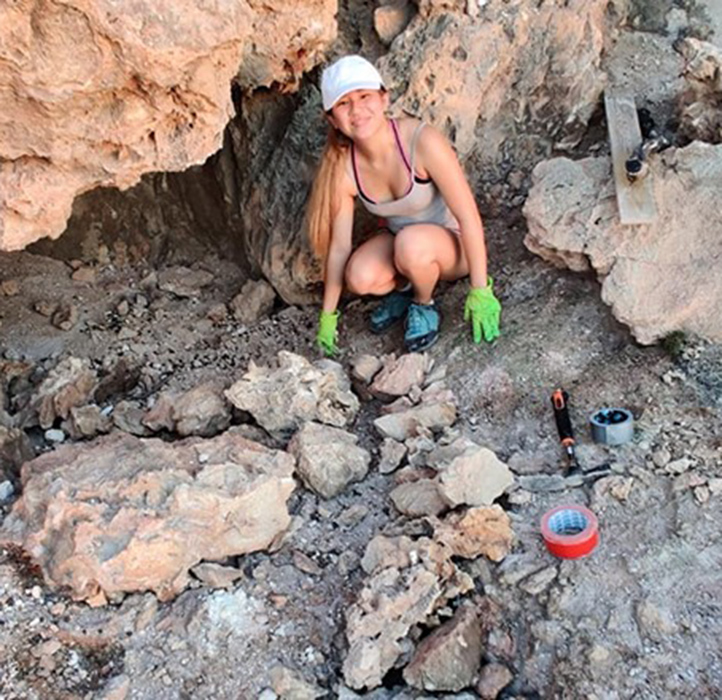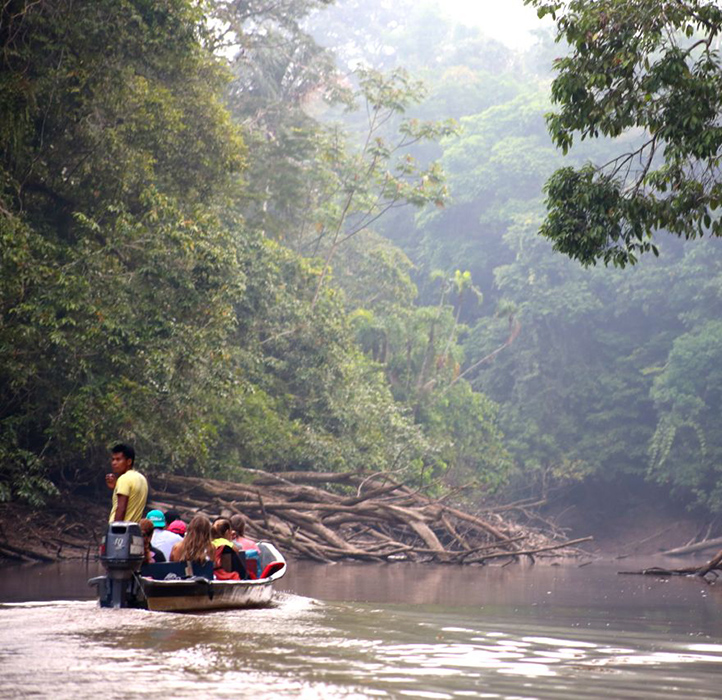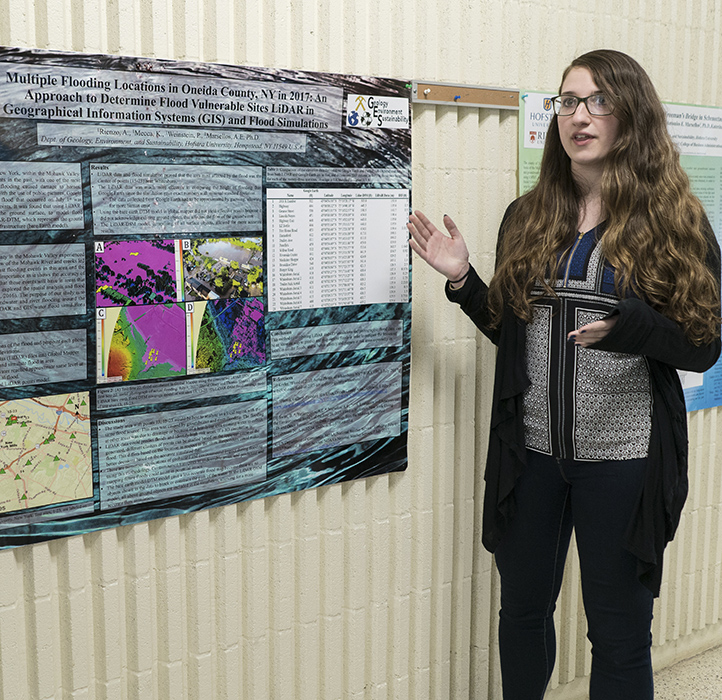Study how the Earth works, the geology and history of our planet, and how you can play a part in safeguarding and managing the environment for future generations.

More About Us
Our students have explored the Galápagos Islands to follow in the footsteps of naturalist and geologist Charles Darwin. They’ve researched volcanoes in Greece, logged thousands of miles in Arizona deserts, and trekked across five states to follow the path of a total solar eclipse.
Students studying Geology and Environmental Resources focus on pure and applied research on the Earth and Earth resources, taking advantage of the diverse range of geological formations and interesting geological problems in the New York metropolitan region and beyond.
Read About Our Galápagos Project
Follow Our Adventures in Belize
Programs and Majors
Hofstra offers two Geology majors, and a major in Environmental Resources. The major you choose comes down to whether you want to pursue a career as a scientist or use your geology degree to inform work in another field, like science writing, education, engineering, or public policy.
Most students studying geology or environmental resources also take classes in Sustainability, on topics such as renewable energy, sustainable agriculture, waste management, and urban planning.
Hofstra also offers minors in Geology and Meteorology.
BS in Geology
The Bachelor of Science in Geology is designed for students who want to pursue graduate studies or professional employment in geology, environmental consulting, geotechnical consulting, or a related scientific discipline. In addition to geology courses, the BS requires additional coursework in physics, biology, chemistry, math, and computer science.
BA in Geology
The Bachelor of Arts in Geology is better suited for students planning to teach Earth Science at the secondary school level or STEM at the elementary school level. The BA requirements leave room for electives so that students can explore other interests or double major in another subject, like journalism, GES, or sustainability.
BS in Environmental Resources
The Bachelor of Science in Environmental Resources is the application of geology and the natural sciences to issues of environmental sustainability, natural resource management, resource development, and conservation. This degree prepares students for careers in environmental geology, environmental science, resource management, environmental law, and environmental regulation.
In the Classroom
Learn from the Experts
Our faculty bring genuine enthusiasm into the classroom and their respective labs. The department chair travels every other year with a group of students to the Galápagos Islands to retrace Darwin’s research. He is the recipient of the 2019 Neil Miner Award from the National Association of Geoscience Teachers, recognizing teaching excellence.
Our expert in geological hazards accompanies students to Greece in the summer where they monitor volcanic activity on the islands of Santorini and Nisyros. The department’s specialist in climate change applied for (and won!) scholarships so her oceanography class could attend the 2020 National Coastal and Estuarine Virtual Summit. And our Meteorology program director uses VR technology to study hurricane preparedness.

Labs and Resources
The Department of Geology, Environment and Sustainability is located in Gittleson Hall. Students work in well-equipped laboratories for sedimentology and paleontology, a mineralogy laboratory equipped for X-ray diffraction and X-ray fluorescence analysis, and a supercomputer laboratory for analyses using large data sets and geographic information systems (GIS).
Gittleson Hall is a designated Collaboratorium, a cutting-edge research and teaching space that includes labs, classrooms, and computer facilities. These facilities are shared by several scientific programs to encourage collaboration across disciplines on research projects ranging from soil analysis of urban areas to bone replacement compounds.

The Student Experience
Hofstra students have participated in research at one of the largest dinosaur track sites in North America, mapped the bedrock geology of New York City, investigated groundwater and soil contamination in the suburbs of Long Island, and sampled coastal marshes for evidence of prehistoric hurricanes. Field trips to geological sites in the mid-Atlantic and New England, Arizona, Wyoming, Greece, and Ecuador are a regular part of the curriculum.
Students also join Hofstra’s chapter of Sigma Gamma Epsilon, the national Earth Science honor society.

Undergraduate Research
We encourage all our students to gain research experience by working with a faculty mentor on a research project. Research may be done for course credit, toward completion of an honors project, or simply for experience. Several of our classes have authentic research projects built into their coursework. Students regularly accompany faculty to professional conferences around the country, such as meetings of the Geological Society of America, the American Geographical Society, and the American Meteorological Society, to present their research.
Examples of research projects include studies of the impact of hazards, such as floods and coastal storms, the analysis of dinosaur trackways and other fossils, measurements of lead contamination in suburban soils on Long Island, mapping of bedrock features using drone imagery, and measurements of trace elements in economic mineral deposits.
Off-Campus Research and Internships
Students are encouraged to pursue summer research opportunities at other universities and government research facilities. Internships provide a means to gain professional experience as well as course credit. Hofstra students regularly work as interns for companies and organizations such as Roux Associates, CA Rich Consultants, and The Nature Conservancy. These internships often lead directly to postgraduate employment for our students.
Hofstra students have gained valuable experience interning at institutions like the U.S. Geological Survey, the Lunar and Planetary Institute, the Jet Propulsion Laboratory, Stanford University, the American Museum of Natural History, the Lamont Doherty Geological Observatory, and the National Park Service.
More About Us
The Outlook
The demand for trained professionals in careers requiring a geology degree – environmental consulting, hydrology, mining, geotechnical consulting, and environmental management – is growing faster than the average for all other occupations over the next decade, according to the U.S. Bureau of Labor Statistics.
Our graduates go on to work in a variety of public and private settings – in university and museum research; in the consulting, mining, engineering, and construction industries; and in environmental management (in both the government and nonprofit sector). A geology degree from Hofstra is also great training for advanced studies, including sustainability, law, medicine, or engineering.
100%
of recent geology and environmental studies alumni responding to a survey reported they were employed or attending or planning to attend graduate school within a year of graduation.
$55K
is the mean annual salary of those recent alumni who reported employment.
Graduate Studies
Examples of institutions where Hofstra geology graduates are pursuing advanced degrees include Bard College, Columbia University, CUNY Hunter College, Hofstra University, Pace University, Syracuse University, Texas A&M University, University of California, Santa Cruz, and University of Georgia.
Contact Us
Department of Geology, Environment and Sustainability
114 Hofstra University
Room 143 Gittleson Hall
Hempstead, NY 11549-1140
Office Hours:
9 a.m. - 4 p.m.,
Monday - Friday
Phone: 516-463-5564
Fax: 516-463-5120
Department Chair
J Bret Bennington
Room 141 Gittleson Hall
516-463-5568
Email





